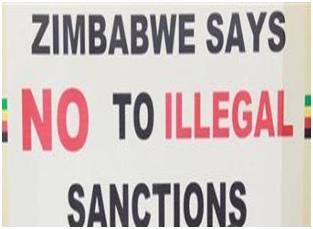Staff Reporter
Zimbabwe continues to grapple with the severe impact of economic sanctions imposed by the United States and its Western allies, which have drained the country of an estimated US$150 billion in lost revenue. Despite calls for their removal, the sanctions remain in place, stifling growth and affecting the livelihoods of countless Zimbabweans.
The sanctions, enacted under the Zimbabwe Democracy and Economic Recovery Act (ZIDERA) of 2001, instruct the US Executive Director to block any vote on loans, credits, or guarantees to the Zimbabwean government by international financial institutions. This has severely limited Zimbabwe’s ability to access vital financial support needed for economic growth, leaving the country’s major industries struggling to survive.
The impact has been devastating for once-thriving companies such as Ziscosteel, the Cold Storage Company (CSC), and the National Railways of Zimbabwe. These firms have faced significant challenges in accessing offshore loans, resulting in shutdowns and job losses.
In an interview with this publication, former Ziscosteel employee Mr Frank Musayirira, who devoted 44 years of his life to the company, described the personal and painful impact of the sanctions.
“I worked for 44 years at Ziscosteel, and when the company folded, I felt like my life had ended too. The demise of the company remains one of the most painful moments of my life,” he shared.
A current Ziscosteel employee , Naison Moyo echoed this sentiment, lamenting the decline of Redcliff, the town that once thrived around the steel plant.
“Our lives took a very huge turn when Ziscosteel closed. It has been very difficult for Redcliff to retain its glorious days. I hope I will live to see the smoke coming out of Zisco again,” he said.
Meanwhile, three years ago, United Nations Special Rapporteur, Professor Alena Douhan, urged the removal of these sanctions, highlighting their detrimental effects on human rights.
“Sanctions on Zimbabwe imposed by Britain and the United States must go. They are hurting human rights,” said Professor Douhan. However, her call for action has yet to be answered, and the economic embargo continues to hinder Zimbabwe’s recovery.
Ziscosteel’s decline serves as a tragic reminder of the broader consequences of economic sanctions. The company was once a major player in Zimbabwe’s industrial sector, providing thousands of jobs and contributing significantly to the economy. However, raw material shortages, financial difficulties, and the inability to secure offshore funding under the weight of sanctions led to its collapse.
The US$150 billion loss in revenue has affected more than just industries; it has hindered essential development projects and stunted economic growth across various sectors. The sanctions have exacerbated issues such as unemployment, poverty, and infrastructure decay, further complicating Zimbabwe’s path to economic recovery.
As Zimbabwe seeks to rebuild its economy, it must contend with the lingering effects of ZIDERA. The sanctions have not only crippled businesses but have also led to a deterioration in social services, healthcare, and education. The continuation of these measures has left the nation struggling to meet the basic needs of its citizens.
Calls for the removal of sanctions are growing louder as Zimbabweans seek to reclaim their economic stability. Development experts, industry leaders, and affected citizens alike are urging the international community to reconsider the restrictive measures that have caused untold hardship.




